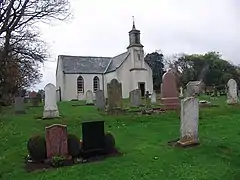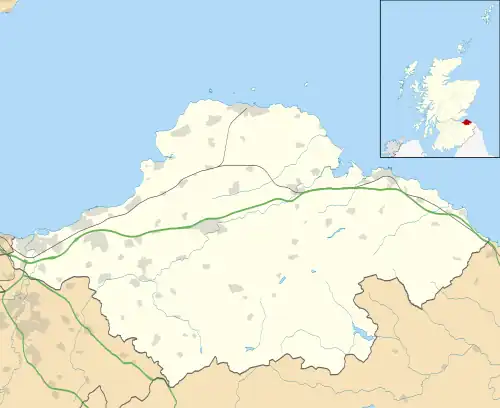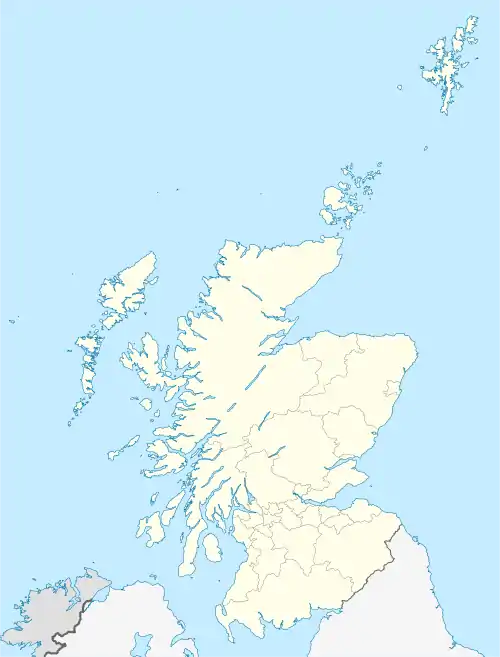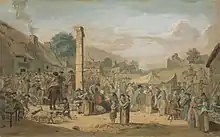Oldhamstocks
Oldhamstocks or Aldhamstocks ("old dwelling place") is a civil parish and small village in the east of East Lothian, Scotland, adjacent to the Scottish Borders and overlooking the North Sea . It is located 6 miles (10 km) south-east of Dunbar[1] and has a population of 193. The church was consecrated by Bishop David de Bernham, 19 October 1242. Its chancel is a fine example of late Gothic — probably fifteenth-century work.[2]
Oldhamstocks
| |
|---|---|
 Oldhamstocks Kirk and kirkyard | |
 Oldhamstocks  Oldhamstocks Location within Scotland | |
| Population | 193 (2001) |
| OS grid reference | NT741706 |
| Civil parish |
|
| Council area | |
| Lieutenancy area | |
| Country | Scotland |
| Sovereign state | United Kingdom |
| Post town | Cockburnspath |
| Postcode district | TD13 |
| Dialling code | 01368 |
| Police | Scotland |
| Fire | Scottish |
| Ambulance | Scottish |
| UK Parliament | |
| Scottish Parliament | |
.jpg.webp)

The summer Gala Day hosts activities such as sporting events. There is also judging of vegetables, plants and artwork.
Prior to 1891 the parish was also partly in Berwickshire and had a detached portion at Butterdean of 1417 acres. The detached portion was transferred to Coldingham, Berwickshire, while the main part of the parish is now wholly within East Lothian.[3]
In 1650 Oliver Cromwell spent a night in the village prior to defeating the Scots at the Battle of Dunbar.[1]
Notable people
- John Broadwood (1732–1812), piano maker and founder of Broadwood and Sons, grew up in Oldhamstocks[4]
- Robert Cranston (1890–1959), first-class cricketer
- John Currie, Moderator of the General Assembly of the Church of Scotland in 1709.[5]
- James Hardy LL.D. (1815-1898), naturalist and antiquarian of Berwickshire and the Scottish Borders, born in Oldhamstocks
- Bonaventure Hepburn OM (born James Hepburn; 14 July 1573, East Lothian – October 1620 or 1621, Venice, Italy) was a Scottish Roman Catholic linguist, lexicographer, philologist and biblical commentator.[6]
- Alexander Somerville (15 March 1811 – 17 June 1885) was a British Radical journalist and soldier[7]
References
- Citations
- AA Book of British Villages. Drive Publications Limited. 1980. p. 305. ISBN 9780340254875.
- Scott 1915.
- Groome 1895.
- Squire 1886.
- Warrick 1913.
- Cooper 1891.
- Harris 1898.
- Sources
- Cochran, John (1791). The statistical account of Scotland. Drawn up from the communications of the ministers of the different parishes. Edinburgh: Printed and sold by William Creech. pp. 402-409.
- Cooper, Thompson (1891). "Hepburn, James (1573-1620)". In Stephen, Leslie; Lee, Sidney (eds.). Dictionary of National Biography. Vol. 26. London: Smith, Elder & Co. p. 157.
- Dick, D. F. S. (1972). "Oldhamstocks Church". History of the Berwickshire Naturalists' Club. 39: 134-138.
- Groome, Francis, Hindes (1885). "Oldhamstocks". Ordnance gazetteer of Scotland : a survey of Scottish topography, statistical, biographical, and historical. Vol. 3. Edinburgh: T.C. Jack. pp. 129-130.
{{cite book}}: CS1 maint: multiple names: authors list (link)
- Groome, Francis, Hindes (1895). "Oldhamstocks". Ordnance gazetteer of Scotland : a survey of Scottish topography, statistical, biographical, and historical. Vol. 5. Edinburgh: T.C. Jack. pp. 128-129.
{{cite book}}: CS1 maint: multiple names: authors list (link)
- Harris, Charles Alexander (1898). "Somerville, Alexander (1811-1885)". In Lee, Sidney (ed.). Dictionary of National Biography. Vol. 53. London: Smith, Elder & Co. pp. 248–249.
- Lewis, Samuel (1851). "Oldhamstocks". A topographical dictionary of Scotland, comprising the several counties, islands, cities, burgh and market towns, parishes, and principal villages, with historical and statistical descriptions: embellished with engravings of the seals and arms of the different burghs and universities. Vol. 2. London: S. Lewis and co. p. 328.
- Moore, Robert (1845). "Parish of Oldhamstocks". The new statistical account of Scotland by Society for the Benefit of the Sons and Daughters of the Clergy. Edinburgh and London: William Blackwood and Sons. pp. 355–356.
- Scott, Hew (1915). Fasti Ecclesiæ Scoticanæ: the succession of ministers in the parish churches of Scotland. Vol. 1 (2nd ed.). Edinburgh: Oliver & Boyd. pp. 412-414.
 This article incorporates text from this source, which is in the public domain.
This article incorporates text from this source, which is in the public domain. - Squire, William Barclay (1886). "Broadwood, John". In Stephen, Leslie (ed.). Dictionary of National Biography. Vol. 6. London: Smith, Elder & Co. pp. 364–365.
- Warrick, John (1913). The moderators of the Church of Scotland from 1690 to 1740. Edinburgh, London: Oliphant, Anderson & Ferrier. pp. 213-224.
External links
- Oldhamstocks information sheet produced by East Lothian Council
- Gazetteer entry
- Entry in the Ordnance Gazetteer of Scotland: A Survey of Scottish Topography, Statistical, Biographical and Historical
- YouTube video footage and narrated history of the Kirk, Aisle and Guard House